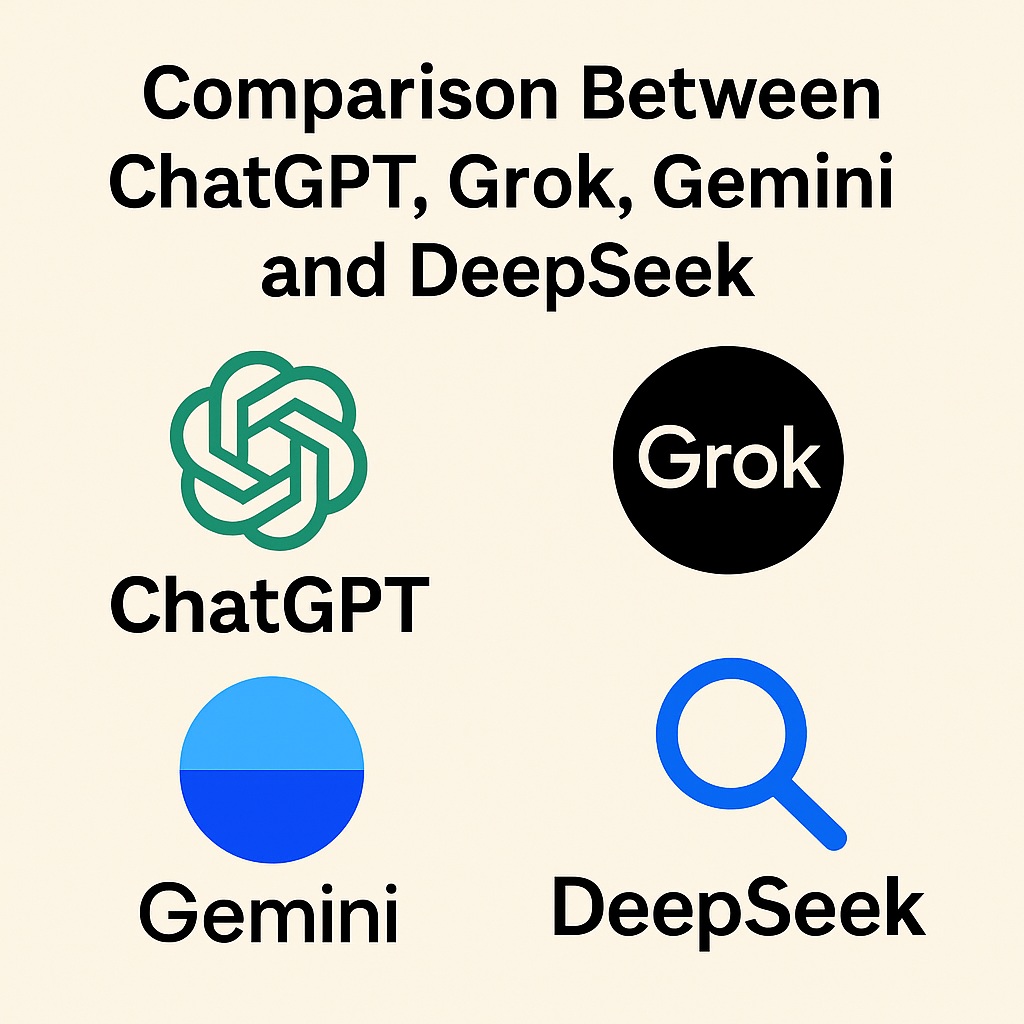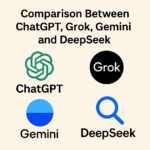Artificial intelligence is moving faster than ever, and several advanced AI chatbots are competing for the spotlight. ChatGPT, Grok, Gemini and DeepSeek are among the most talked-about language models right now. Each offers unique strengths – from everyday conversations and creative writing to coding support and real-time data access. But what makes them different in terms of use cases, infrastructure, costs, and special features?
Let’s dive into a human-friendly, enthusiastic overview of the current landscape.
Here is a small video overview about it:
Use Cases: Where Each Model Excels
- ChatGPT – the versatile all-rounder
OpenAI’s ChatGPT has become the go-to AI for millions. It shines in creative writing, brainstorming, customer support, and programming assistance. With powerful reasoning skills and a natural conversational flow, ChatGPT often feels like talking to a human. Whether you’re writing a blog post, debugging code, or generating marketing ideas, ChatGPT delivers solid, well-structured results. - Grok – the real-time challenger
Grok, developed by Elon Musk’s xAI, stands out because it can tap into live data from X (formerly Twitter). This makes it especially useful for trending topics, breaking news, and up-to-the-minute research. Grok also has a quirky, witty personality: its responses can be sarcastic, humorous, and less filtered. If you’re after quick takes on current events or want a chatbot with character, Grok is hard to beat. - Gemini – Google’s multimodal powerhouse
Gemini was built from the ground up to be multimodal, meaning it can process not only text but also images, audio and even video. It integrates seamlessly into Google’s ecosystem: Gmail, Docs, Sheets and more. For productivity and collaboration, Gemini is incredibly strong – think analyzing a spreadsheet, summarizing a PDF, or generating visuals alongside text. If you’re deep into Google tools, Gemini is the natural fit. - DeepSeek – the open-source specialist
DeepSeek, an emerging project from China, takes a very different approach: it’s fully open source. The model is optimized for technical domains like coding, mathematics, and research. Its training approach (Mixture-of-Experts) makes it surprisingly efficient compared to Western rivals. For developers, academics, and startups who want freedom, transparency, and customizability, DeepSeek is a compelling option.
Infrastructure and Technical Foundations
- ChatGPT: Runs exclusively in the cloud on OpenAI’s proprietary infrastructure. No self-hosting possible, but users benefit from stability and constant updates.
- Grok: Powered by massive GPU clusters. Built for live search and analysis at scale. Only available through xAI/X platforms, not self-hostable.
- Gemini: Trained and deployed on Google’s TPUs. Offers huge context windows (up to 1M tokens in some versions) and native multimodality. Fully cloud-based, with access via Google Bard or Vertex AI.
- DeepSeek: Released as open models that can be run locally or in the cloud. Efficient architecture reduces compute costs. Flexible, but requires technical know-how for deployment.
Pricing and Accessibility
- ChatGPT: Free tier with GPT-3.5. ChatGPT Plus costs around $20/month and gives access to GPT-4 and extra features like browsing and plugins. API pricing is usage-based. Enterprise packages are available.
- Grok: Premium-only. Access starts at roughly $30/month, often bundled with X Premium+. Enterprise API access is available separately. No free plan for now.
- Gemini: Basic usage via Google Bard is free. Gemini Advanced (with Ultra models and extended features) is included in some Google One subscriptions or via Google Cloud (usage-based billing).
- DeepSeek: Completely free to download and use. No subscription fees – only infrastructure costs if you run it yourself. Some third-party hosts may offer managed access.
Features and Capabilities
- ChatGPT: Plugins, browsing (Pro), image understanding, code assistance, document uploads, and even voice interaction. Great for creative tasks, coding and general productivity.
- Grok: Real-time web access, integration with social data from X, image generation, conversational personality with humor. Strong for live topics and current trends.
- Gemini: Multimodal input (text, images, audio, video), very large context length, and seamless integration with Google Workspace. Perfect for productivity workflows.
- DeepSeek: Strong in programming, logic, and mathematics. Transparent reasoning (“shows its work”). Multilingual with a focus on Chinese. Open to customization, though less user-friendly out of the box.
Conclusion: Choosing the Right AI
In the comparison between ChatGPT, Grok, Gemini and DeepSeek, it’s clear that each shines in different contexts:
- ChatGPT → best all-round choice for everyday creativity, customer support, and development.
- Grok → ideal if you need real-time knowledge and personality-driven interaction.
- Gemini → unmatched for multimodal tasks and Google ecosystem productivity.
- DeepSeek → perfect for open-source enthusiasts, researchers, and cost-conscious developers.
No single model is “the best” – the right choice depends on your needs. But the exciting part is that competition is driving rapid innovation, making AI assistants more capable, personal, and powerful than ever.
The future of AI isn’t about choosing just one – it’s about finding the right partner for the right task.





Leave a Reply